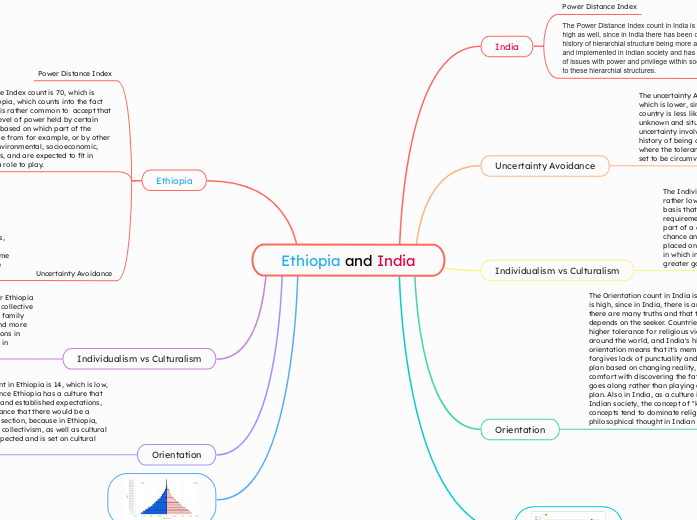Ethiopia and India
Ethiopia
Power Distance Index
The Power Distance Index count is high in Ethiopia, which counts into the fact that in Ethiopia, it is rather common to accept that there is a certain level of power held by certain individuals purely based on which part of the country you may be from for example, or by other factors, such as environmental, socioeconomic, and genetic factors, and are expected to fit in society and have a role to play.
Uncertainty Avoidance
Compared to India, Ethiopia has a higher Uncertainty Avoidance count, which means that the general public may be or is likely to be more uncomfortable with the unknown and ambiguity, since Ethiopia had a higher power distance index count, presuming that the country values hierarchial rules and societal expectations, are less likely to accept when the standards for those rules are out of place, which could play some sort of role with the unknown or situations where there seems to be a lack of control or authority.
Individualism vs Culturalism
The Individualism vs Culturalism count for Ethiopia is low, since Ethiopia is a more collective country that bases a lot of importance on family values, relationships, group obligation, and more of a focus on family values and expectations in general since it is a big part of the culture in Ethiopia.
Orientation
The Orientation count in Ethiopia is low, which means that since Ethiopia has a culture that solely runs on rules and established expectations, there is a likelier chance that there would be a lower count for this section, because in Ethiopia, social etiquette and collectivism, as well as cultural ties, are more so expected and is set on cultural norms.
India
Power Distance Index
The Power Distance Index count in India is high as well, since in india there has been documented history of hierarchial structure being more appreciated and implemented in Indian society and has had history of issues with power and privilege within societies due to these hierarchial structures.
Uncertainty Avoidance
The uncertainty Avoidance count in India is lower, similar to how Ethiopia also as a country is less likely to be more accepting of the unknown and situations that have some sort of uncertainty involved, India as a country has had history of being a traditionally patient country where the tolerance is high but rules in place are set to be circumvened in general
Individualism vs Culturalism
The Individualism vs Culturalism count in India is rather lower, simply since on the basis that in India, the societal requirements in place require being involved as a part of a collective, and that there is a higher chance and a more higher level of importance placed on belonging to a larger social framework in which individuals are expected to act for the greater good of one's defined in group.
Orientation
The Orientation count in India is high, since in India, there is an acceptance that there are many truths and that the truth often depends on the seeker. Countries like India have a higher tolerance for religious views from all around the world, and India's high score on orientation means that it's members typically forgives lack of punctuality and a changing game plan based on changing reality, and general comfort with discovering the fated path as one goes along rather than playing along to an exact plan. Also in India, as a culture in a huge part of Indian society, the concept of ''karma'' and similar concepts tend to dominate religious and philosophical thought in Indian culture as well.
